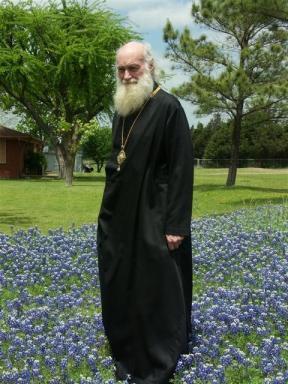by Fr. Stephen Freeman
 Originally titled “Living Orthodox in the Modern World,” this article from the blog “Glory To God For All Things” is worth reading. The reason I have reposted it here is simple: We are here, now, and have been placed here by God, for whatever reason, to preach the Gospel to the whole creation. It is not for nothing that we have come to this time and place in our nation, and worthy of our attention and reflection as we enter the bright sadness of Great Lent 2011.
Originally titled “Living Orthodox in the Modern World,” this article from the blog “Glory To God For All Things” is worth reading. The reason I have reposted it here is simple: We are here, now, and have been placed here by God, for whatever reason, to preach the Gospel to the whole creation. It is not for nothing that we have come to this time and place in our nation, and worthy of our attention and reflection as we enter the bright sadness of Great Lent 2011.
We live in the modern world – a fact for which we have no antidote. It is the moment in history that is ours. Christians before us have lived in the Roman world, various pagan worlds, the Byzantine world, the world of “Holy Russia,” but we are tasked by Divine Providence to live as Orthodox Christians in the modern world. It is a setting that has its own unique challenges and its own unique temptations.
For Orthodox Christians who live in countries that historically have no (or very little) Orthodox history the chances are that their lives will be saturated at almost every point with modern secularism. This is not a philosophy of atheism, but a cultural milieu that understands the world in which we live to be somehow distinct from whatever God there may (or may not) be. A secularist often believes in God – but he believes the world is its own self-defined mode of existence.
Living in an alien culture is nothing new for Christians – we began in the surroundings of a sophisticated (sometimes) pagan culture (Rome) that was suffused with mysticism from the East, mystery cults, philosophical debate and speculation. It was, we can say, the time and place chosen by God for the manifestation of light to the Gentiles – the Church of the Ages.
By the same token, we must accept that we are appointed to live in this time of an alien (modern) culture that spans a wide range of religious, secular and scientific thought. I have found no better statement of our situation than this quote from Fr. Georges Florovsky (20th century):
Orthodoxy is summoned to witness. Now more than ever the Christian West stands before divergent prospects, a living question addressed also to the Orthodox world… The ‘old polemical theology’ has long ago lost its inner connection with any reality. Such theology was an academic discipline, and was always elaborated according to the same western ‘textbooks.’ A historiosophical exegesis of the western religious tragedy must become the new ‘polemical theology.’ But this tragedy must be reendured and relived, precisely as one’s own, and its potential catharsis must be demonstrated in the fullness of the experience of the Church and patristic tradition. In this newly sought Orthodox synthesis, the centuries-old experience of the Catholic West must be studied and diagnosed by Orthodox theology with greater care and sympathy than has been the case up to now… The Orthodox theologian must also offer his own testimony to this world — a testimony arising from the inner memory of the Church — and resolve the question with his historical findings.”
– Georges Florovsky, Ways of Russian Theology II, pp. 302-304
His statement that
“this tragedy must be reendured and relived, precisely as one’s own,”
is worthy of St. Silouan of Mt. Athos. The tragedy is the religious failure of the West in the face of modernity (as well as the errors that led to such a failure). But their correction does not come in the context of debate and argument (“the old polemical theology has long ago lost its inner connection with any reality”). The healing is more akin to Christ’s healing of our human sin. In His union with our humanity, our humanity is not destroyed, but healed and deified.
Orthodoxy should not seek to destroy the alien culture which surrounds us, but to endure it, and in the love of Christ, in the ascesis of the body and mind, heal that which is broken. In my own experience, such redemption is not the work of a single generation (I am already a generation removed from Florovsky – as well as a generation removed from many of my readers). We have not been given a commandment to change the world, but a commandment to obey the gospel. That obedience, I believe, today includes the necessity that we
“reendure and relive, precisely as our own, the religious tragedy of the modern world.”
On the one hand, this means that those of us who are the children of the West, do not suddenly sound as though we had never lived here. The condemnation of the West (precisely part of the “old polemical theology”) mostly provides grist for conversation, much of which is less than fruitful. Simply being Baptized or Chrismated does not make us “Eastern.” It unites us with Christ’s Holy Church (and Christ Himself) – but it is precisely that union which must not be given short shrift.
 I have perhaps best seen this displayed in the life and behavior of Archbishop Dmitri of Dallas (retired). A convert from the Baptist Church as a teenager (in 1940), he entered an American Orthodoxy that did not speak English. His analysis of Western culture, and the “religious tragedy” of the West were always keen (often the subject of his sermons) and yet he spoke with a kindness and compassion that made it clear that he did not consider himself superior to the tragedy nor somehow separated from those around him.
I have perhaps best seen this displayed in the life and behavior of Archbishop Dmitri of Dallas (retired). A convert from the Baptist Church as a teenager (in 1940), he entered an American Orthodoxy that did not speak English. His analysis of Western culture, and the “religious tragedy” of the West were always keen (often the subject of his sermons) and yet he spoke with a kindness and compassion that made it clear that he did not consider himself superior to the tragedy nor somehow separated from those around him.
For myself, I first met him when I was an Episcopal priest exploring Orthodoxy. His warmth and hospitality (he wanted to know what I thought, and was quick to speak well of things we shared in common) created a space in which I could bring the “tragedy” of my own religious journey into contact with the fullness of Orthodoxy. (I was always touched by the fact that during the five or more years of our relationship prior to my conversion, he insisted on addressing me as “Father,” and continued to do so even after my conversion, though my ordination as an Orthodox priest would not come for another 13 months.)
I cited St. Silouan earlier because of his great love and his maxim:
“Keep your mind in hell and despair not.”
Within his prayers and inner experience, his love extended to the lost, even the lost in Hades, and he prayed, not as one who was separated, but as one who was himself united to them in their tragedy (while still be united to Christ).
We live when and where we are for a reason (known only to God). But it is here and now that we will find salvation, and in the peace of that salvation in its fullness, thousands around us will be saved.
